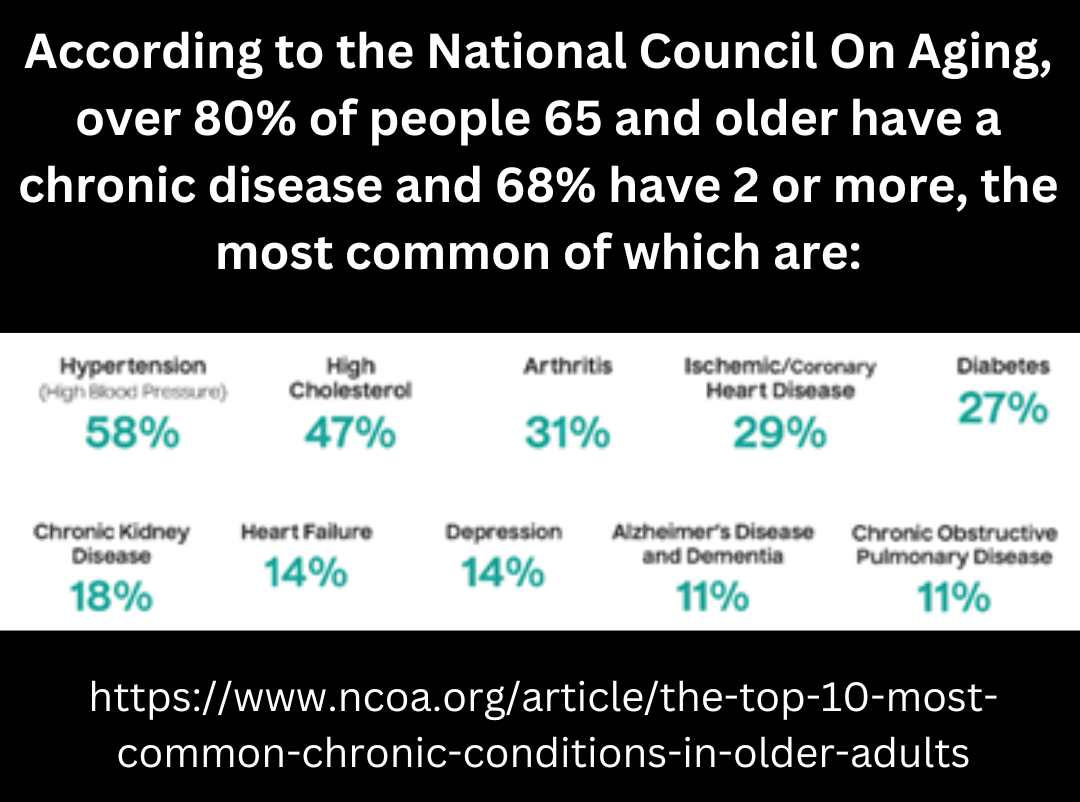
Poppaw's
Homegrown

Poppaw's
Homegrown
Blog Layout
Stop Inflammation from Wreaking Havok in Your Body!
April 11, 2023
Inflammation Is a Leading Cause of Chronic Diseases

Inflammation is a natural process that occurs in the body in response to infection, injury or other forms of damage. It is a complex biological response that involves a series of events that ultimately help to heal and repair damaged tissue. However, when inflammation becomes chronic, it can lead to a host of health problems that can affect nearly every aspect of the body.
Chronic inflammation has been linked to a number of health problems, including heart disease, diabetes, Alzheimer's disease, and cancer. Inflammation can cause damage to the body in a number of ways, including:
1. Damage to the blood vessels: Chronic inflammation can cause damage to the walls of blood vessels, leading to the formation of plaques that can narrow the arteries and reduce blood flow to vital organs. This can increase the risk of heart disease, stroke, and other cardiovascular problems.
2. Damage to the joints: Chronic inflammation can cause damage to the joints, leading to conditions such as arthritis and joint pain. Inflammation can cause the synovial fluid in the joints to become thick and sticky, leading to pain and stiffness.
3. Damage to the brain: Chronic inflammation has been linked to a number of neurological conditions, including Alzheimer's disease and Parkinson's disease. Inflammation can cause damage to the brain cells, leading to cognitive decline and memory problems.
4. Damage to the digestive system: Chronic inflammation can cause damage to the digestive system, leading to conditions such as inflammatory bowel disease and irritable bowel syndrome. Inflammation can cause the lining of the digestive tract to become inflamed and damaged, leading to digestive problems such as diarrhea, constipation, and abdominal pain.
5. Damage to the skin: Chronic inflammation can cause damage to the skin, leading to conditions such as eczema, psoriasis, and acne. Inflammation can cause the skin to become red, swollen, and itchy, leading to discomfort and irritation.
6. Damage to the lungs: Chronic inflammation has been linked to a number of respiratory conditions, including asthma and chronic obstructive pulmonary disease (COPD). Inflammation can cause the airways in the lungs to become inflamed and narrowed, leading to breathing difficulties.
In addition to these specific health problems, chronic inflammation has also been linked to a number of other health issues, including obesity, depression, and autoimmune disorders. Inflammation can cause the body to produce high levels of stress hormones, which can affect mood and mental health. Chronic inflammation can also cause the immune system to become overactive, leading to autoimmune disorders such as lupus and rheumatoid arthritis.
So, what can be done to reduce inflammation and its damaging effects on the body? There are several things that can be done to reduce chronic inflammation, including:
1. Eating a healthy diet: Reducing/eliminating sugar and eating a diet rich in fruits, vegetables, whole grains, and lean protein can help to reduce inflammation in the body. Foods that are high in sugar, saturated and trans fats, such as processed foods and fried foods, can increase inflammation in the body.
2. Getting regular exercise: Exercise has been shown to reduce inflammation in the body. Regular exercise can help to reduce inflammation and improve overall health.
3. Managing stress: Stress can increase inflammation in the body. Finding ways to manage stress, such as practicing relaxation techniques or meditation, can help to reduce inflammation and improve overall health.
4. Quitting smoking: Smoking has been shown to increase inflammation in the body. Quitting smoking can help to reduce inflammation and improve overall health.
5. Taking Poppaw’s Homegrown Elderberry Syrup daily!
Elderberry syrup has been shown to have anti-inflammatory properties, which may be why it is believed to be beneficial in reducing inflammation in the body. Elderberry syrup contains several compounds, including anthocyanins, flavonols, and phenolic acids, which have been shown to possess anti-inflammatory properties.
Elderberry syrup has been shown to inhibit the production of cytokines, which are proteins that play a key role in the inflammatory response. By reducing the production of cytokines, elderberry syrup may help to reduce inflammation in the body.
Additionally, elderberry syrup has been shown to have antioxidant properties, which can also help to reduce inflammation. Oxidative stress, which occurs when there is an imbalance between the production of free radicals and the body's ability to neutralize them, can contribute to inflammation. Antioxidants help to neutralize free radicals and reduce oxidative stress, which can help to reduce inflammation.
Overall, while more research is needed to fully understand the mechanisms by which elderberry syrup may help reduce inflammation, it is believed that its anti-inflammatory and antioxidant properties play a key role.
In conclusion, chronic inflammation can have serious and far-reaching effects on the body, including damage to the blood vessels, joints, brain, digestive system, skin, and lungs. However, there are several steps that can be taken to reduce chronic inflammation, such as adopting a healthy diet, getting regular exercise, managing stress, quitting smoking, and taking Poppaw’s Homegrown Elderberry Syrup daily. By taking these steps, individuals can reduce their risk of developing chronic inflammation and improve their overall health and well-being.

May 3, 2023
Your brain is the most critical organ in your body, responsible for controlling all your bodily functions, thoughts, emotions, and behaviors. It's essential to take care of your brain to maintain optimal brain health, cognitive function, memory, and overall wellbeing. According to the CDC, the majority of adults in America suffer from chronic diseases: 6 in 10 adults suffer from one chronic disease and 4 in 10 adults suffer from 2 or more chronic diseases. Diseases of the brain, such as Alzheimer's Disease, which affects over 6 million Americans, are thought to be caused by a combination of genetic, environmental, and lifestyle factors, including chronic inflammation, oxidative stress, and the accumulation of abnormal protein deposits in the brain. The odds are stacked against you that you’re more than likely to suffer from one or more chronic diseases, so let’s explore some natural remedies for the brain so you can improve your odds and improve your brain function naturally. While there are many drugs and supplements available that claim to enhance brain function, there are also natural remedies for brain health that can improve brain function without the harmful side effects. We’ve compiled the top ten best natural remedies for brain health. Let’s start with the top five… #1 Elderberry Syrup: Can improve brain function naturally in multiple ways and can protect against inflammation and oxidative stress. Elderberry syrup is a great brain booster! #2 Omega-3 Fatty Acids: Can reduce inflammation and support healthy brain function. #3 Turmeric: Contains curcumin which can help protect the brain from inflammation and oxidative stress. #4 Blueberries: Can help protect the brain from oxidative stress and improve cognitive function. #5 Exercise, Meditation, and Rest: Exercise improves blood flow to the brain and certain exercises have been shown to assist with Parkinson’s and other degenerative brain diseases. Meditation can reduce stress and anxiety and proper sleep is critical for overall brain function and wellbeing. Below, we’ll go into detail about how our top five can improve brain function naturally, but before doing so, we want to encourage everyone to incorporate the top five into their daily lives. We cannot stress enough the importance of brain health. With that said, here are the runner up natural remedies to improve brain function: #6 Ginkgo Biloba: Has been shown to improve memory and cognitive function. #7 Bacopa Monnieri: Some studies suggest that it can improve memory and cognitive function. #8 Lion’s Mane Mushroom: Contains compounds that can stimulate nerve growth and improve cognitive function. #9 Dark Chocolate: Contains flavonoids that can improve blood flow to the brain and support healthy brain function. #10 Resveratrol: A natural compound found in red wine and grapes that has been shown to have neuroprotective effects. How do these natural remedies improve brain function? Let’s take a deep dive into the top five… Elderberry Syrup: A Natural Brain Booster One of the best natural remedies for brain health is elderberry syrup. Elderberries are a rich source of flavonoids, which are powerful antioxidants that can protect the brain from oxidative stress and inflammation. Oxidative stress and inflammation are two significant contributors to brain aging and neurodegenerative diseases such as Alzheimer's and Parkinson's. Elderberry syrup is a rich source of antioxidants called anthocyanins, which have been shown to have a number of potential health benefits, including their ability to support brain function. In addition to its antioxidant properties, elderberry syrup also contains high levels of vitamin C, which is essential for healthy brain function. Vitamin C is a powerful antioxidant that can protect the brain from free radical damage and improve cognitive function. Studies have shown that vitamin C supplementation can improve memory, attention, and overall cognitive function in both healthy individuals and those with cognitive impairment. Elderberry syrup also has anti-inflammatory properties that can reduce inflammation in the brain. Chronic inflammation is a significant contributor to brain aging and neurodegenerative diseases. By reducing inflammation, elderberry syrup can protect the brain from damage and improve cognitive function. Furthermore, elderberry syrup has immune-boosting properties that can enhance the body's natural defense system against infections and diseases. A healthy immune system is critical for brain health because it can prevent infections that can cause inflammation and damage to the brain. To reap the benefits of elderberry syrup, you can consume it in its pure form or mix it with water or other beverages. It's a delicious and convenient way to support brain health naturally. Omega-3 Fatty Acids: A Natural Brain Food Omega-3 fatty acids are essential nutrients that are critical for brain health. These fatty acids are found in high concentrations in the brain and are involved in many brain functions, such as memory, mood, and cognition. Omega-3 fatty acids can also reduce inflammation in the brain, which can protect against neurode generative diseases and improve cognitive function. Studies have shown that omega-3 fatty acids can improve memory, attention, and overall cognitive function in both healthy individuals and those with cognitive impairment. Furthermore, omega-3 fatty acids can reduce the risk of developing neurodegenerative diseases such as Alzheimer's and Parkinson's. To incorporate omega-3 fatty acids into your diet, you can consume fatty fish such as salmon, tuna, and sardines. You can also take omega-3 supplements such as fish oil or krill oil. However, it's essential to consult with a healthcare professional before taking any supplements. Turmeric: A Natural Brain Protector Turmeric is a spice that has been used for thousands of years in traditional medicine systems such as Ayurveda and Chinese medicine. It is known for its anti-inflammatory and antioxidant properties, which have been linked to a range of health benefits, including its potential to support brain function. Curcumin, the active ingredient in turmeric, has been shown to have neuroprotective effects by reducing inflammation and oxidative stress in the brain. Inflammation and oxidative stress are two key factors that contribute to the development and progression of neurodegenerative diseases such as Alzheimer's and Parkinson's disease. In addition, curcumin has been shown to increase levels of brain-derived neurotrophic factor (BDNF), a protein that plays a role in the growth and survival of neurons in the brain. Low levels of BDNF have been associated with cognitive decline and mood disorders. Blueberries: A Natural Brain Food We recommend consuming these delicious berries regularly as part of a healthy diet. Blueberries are a rich source of antioxidants called anthocyanins, which give them their deep blue color. These compounds have been shown to have a number of potential health benefits, including their ability to support brain function. Research has linked blueberries to improved cognitive performance, particularly in tasks that involve memory and learning. This may be due to the ability of anthocyanins to cross the blood-brain barrier and exert their antioxidant and anti-inflammatory effects directly in the brain. In addition to their antioxidant properties, blueberries are also a good source of fiber, vitamin C, vitamin K, and other nutrients that are important for overall brain health. For example, vitamin K has been shown to have a role in maintaining healthy brain function, while fiber helps to support a healthy gut microbiome, which has been linked to improved cognitive function. EXERCISE: Regular exercise can enhance blood flow to the brain, which can improve cognitive function, memory, and overall brain health. Exercise can also increase the production of neurotrophic factors, which are proteins that promote the growth and survival of brain cells. These proteins are critical for brain plasticity, which is the brain's ability to adapt and change throughout life. Studies have shown that regular exercise can improve cognitive function and memory in both young and older adults. Even a single session of moderate exercise can enhance cognitive function and attention. Therefore, incorporating regular exercise into your daily routine is an excellent way to support brain health naturally. People with Parkinson’s disease might strongly consider enrolling in a Rock Steady Boxing (RSB) class. RSB is a specialized exercise program designed to help people with Parkinson's disease improve their physical fitness and quality of life. Don’t worry, it’s not getting in a boxing ring and knocking each other out! Rock Steady Boxing classes are a great way to improve your physical fitness and quality of life in a fun and supportive environment without having to worry about actual fighting or sparring with other participants. There have been so many success stories with RSB that it’s growing internationally at a rapid rate. Check out our other blog for more information or join a class by contacting your local YMCA or M-Power Gym in Vandalia, Ohio https://www.mpowergymllc.com/ (contact Angie Bier 937-941-5121). MEDITATION: Meditation is a natural remedy for brain health that can improve brain function naturally by reducing stress and anxiety. Stress and anxiety can have harmful effects on the brain, such as reducing cognitive function and memory. Studies have shown that regular meditation can enhance brain function, memory, and attention. Meditation can also increase the thickness of the prefrontal cortex, which is the part of the brain responsible for decision-making, planning, and attention. Therefore, incorporating meditation into your daily routine is an excellent way to support brain health naturally. REST: Sleep is a natural remedy for brain health that is critical for overall brain function and wellbeing. During sleep, the brain consolidates memories, removes waste products, and recharges for the next day. Sleep deprivation can have harmful effects on the brain, such as reducing cognitive function, memory, and attention. Furthermore, sleep can reduce the risk of developing neurodegenerative diseases such as Alzheimer's and Parkinson's. To support brain health naturally, it's essential to get regular and sufficient sleep. Adults should aim for seven to eight hours of sleep per night, while children and teenagers require more. In conclusion, there are many natural remedies for brain health that can improve brain function naturally. Elderberry syrup is one of the best natural remedies for brain health, with its antioxidant, anti-inflammatory, and immune-boosting properties. Elderberry syrup can protect the brain from oxidative stress and inflammation, potentially improve cognitive function, and enhance the body's natural defense system against infections and diseases. In addition to elderberry syrup, turmeric, blueberries, omega-3 fatty acids, regular exercise, meditation, and sleep are also excellent natural remedies for brain health. Please take this seriously so you can shift the odds in your favor of avoiding chronic brain diseases. At Poppaw’s Homegrown, we want you to be healthy and enjoy life, so take good care of your brain!

By Joy Beckstedt
•
April 26, 2023
Your immune system isn't just for fighting off the sniffles. It's way more important than that. Way more. When your immune system is compromised, it can lead to a lot of serious health concerns. On the flip side, when you keep your immune system healthy, it gives you a lot of incredible benefits that you shouldn't take for granted. That's why we advocate for elderberry syrup. It's one way to supercharge your immune system so it can help you in all different aspects of your life. To name a few... 1. Protection against infections: A healthy immune system is essential for protecting the body against infections caused by bacteria, viruses, and other pathogens. A healthy immune system is our first line of defense against infections. It produces antibodies that identify and neutralize harmful pathogens. The immune system also has cells that destroy infected cells and remove the pathogens from the body. Without a healthy immune system, our bodies are vulnerable to infections. This can result in a range of illnesses, from the common cold to more severe diseases such as pneumonia and meningitis. 2. Faster recovery from illness: With a robust immune system, your body can recover faster from infections and illnesses. A healthy immune system not only protects us from infections but also helps us recover faster from illnesses. When our bodies are infected with a pathogen, the immune system goes into action, producing antibodies and activating immune cells to fight the infection. Once the infection is under control, the immune system continues to work, repairing damaged tissues and restoring our health. This process is faster and more effective when our immune system is healthy. 3. Reduced risk of chronic diseases: A strong immune system can help reduce the risk of developing chronic diseases like diabetes, heart disease, and cancer. Chronic diseases, such as heart disease, diabetes, and cancer, are major health concerns worldwide. A healthy immune system can help reduce the risk of developing these diseases. Studies have shown that chronic inflammation, caused by an overactive immune system, can contribute to the development of chronic diseases. A healthy immune system can help regulate inflammation, reducing the risk of chronic diseases. 4. Improved mental health: A healthy immune system can improve your mental health by reducing inflammation and oxidative stress. There is a strong link between our immune system and our mental health. Research has shown that inflammation, caused by an overactive immune system, can contribute to the development of mental health disorders such as depression and anxiety. A healthy immune system can help reduce inflammation and promote healthy brain function, improving our mental health and wellbeing. 5. Increased energy levels: With a healthy immune system, you are less likely to suffer from fatigue and can have more energy to engage in physical activities. When our immune system is healthy, we are less likely to suffer from fatigue. This is because a healthy immune system can fight off infections and illnesses, reducing the energy our bodies need to devote to these processes. This means we have more energy for other activities, such as exercise and work, improving our overall quality of life. 6. Better digestion: A strong immune system can help improve digestion by reducing inflammation and promoting healthy gut flora. A healthy immune system can help improve digestion by promoting healthy gut flora and reducing inflammation. The gut microbiome plays a vital role in our immune system, and a healthy microbiome is essential for a healthy immune system. Research has shown that the immune system and gut microbiome work together to regulate inflammation and promote healthy digestion. 7. Improved sleep: A healthy immune system can help regulate the sleep cycle and promote restful sleep. A healthy immune system can help regulate our sleep cycle, promoting restful sleep. Research has shown that the immune system produces cytokines, which are proteins that regulate our sleep cycle. When our immune system is healthy, it produces the right amount of cytokines, promoting healthy sleep patterns. 8. Healthy aging: A healthy immune system can help protect against age-related diseases and promote healthy aging. As we age, our immune system naturally weakens, making us more vulnerable to infections and illnesses. A healthy immune system can help protect against age-related diseases and promote healthy aging. Research has shown that a healthy immune system can reduce the risk of age-related diseases such as Alzheimer's and Parkinson's disease. 9. Improved fertility: A strong immune system can improve fertility by reducing inflammation and promoting healthy reproductive organs. A healthy immune system can improve fertility by reducing inflammation and promoting healthy reproductive organs. Research has shown that inflammation can contribute to infertility in both men and women. A healthy immune system can reduce inflammation, improving fertility and increasing the chances of conceiving. 10. Better overall quality of life: A healthy immune system can improve your overall quality of life by reducing the risk of illness, promoting physical and mental health, and increasing vitality and energy levels. By taking steps to improve our immune system, we can improve our overall health and wellbeing, making us better equipped to handle the challenges of daily life. Now, l et's reverse those and see what can happen when your immune system is compromised... more infections, slower recovery from illness, increased risk of chronic diseases, poor mental health, fatigue... you get the picture. It's not pretty. So, how about boosting your immune system? Elderberry syrup is a great way to do it, but there's more you can do: 1. Eat a healthy diet: A healthy diet is essential for a healthy immune system. Eating a diet rich in fruits, vegetables, whole grains, and lean protein can provide our bodies with the nutrients and antioxidants needed to support our immune system. This is also where elderberry syrup comes in. Taking only 1 tablespoon a day of elderberry syrup can give your immune system a fantastic boost. 2. Get enough sleep: Sleep is essential for a healthy immune system. Getting enough sleep can help regulate our immune system, reduce inflammation, and improve overall health and wellbeing. 3. Exercise regularly: Regular exercise is essential for a healthy immune system. Exercise can help regulate inflammation, improve circulation, and strengthen our immune system. 4. Manage stress: Stress can negatively impact our immune system. Learning to manage stress through techniques such as meditation, yoga, and deep breathing can help support a healthy immune system. 5. Avoid smoking and excessive alcohol consumption: Smoking and excessive alcohol consumption can weaken our immune system, making us more vulnerable to infections and illnesses. Did we mention taking elderberry syrup? Ok, ok, I know we did. In conclusion, a healthy immune system is essential for our overall health and wellbeing. It protects us from infections, helps us recover from illness, and reduces the risk of chronic diseases. By taking steps to improve our immune system, such as eating a healthy diet, getting enough sleep, exercising regularly, managing stress, and avoiding smoking and excessive alcohol consumption, we can support our immune system and improve our overall health and wellbeing. Wishing you a happy, healthy life!

April 11, 2023
Elderberry syrup is a natural remedy that has gained popularity in recent years due to its numerous health benefits. One area of interest for many people is its potential to promote heart health. In this blog, we'll explore the ways in which elderberry syrup can benefit the heart and provide evidence from scientific studies to support these claims. Firstly, it's important to understand how the heart functions and what factors can contribute to heart disease. The heart is a muscle that pumps blood throughout the body, providing essential nutrients and oxygen to organs and tissues. When the heart becomes weakened or damaged, it can lead to a range of cardiovascular diseases such as coronary artery disease, heart attacks, and stroke. Several factors can contribute to the development of heart disease, including high blood pressure, high cholesterol levels, obesity, and inflammation. These factors can cause damage to the blood vessels and arteries, leading to a buildup of plaque that can restrict blood flow and increase the risk of heart disease. Elderberry syrup contains several compounds that have been shown to benefit heart health. Let's explore each of these in more detail. 1. Anti-inflammatory properties: Inflammation is a natural response by the body's immune system to protect against injury and infection. However, chronic inflammation can contribute to the development of numerous diseases, including heart disease. Elderberry syrup contains flavonoids, which are plant-based compounds with potent anti-inflammatory properties. A study published in the Journal of Medicinal Food found that elderberry extract reduced the production of pro-inflammatory cytokines in human cells, suggesting that it may be useful in reducing inflammation in the body. Another study published in the Journal of Agricultural and Food Chemistry found that elderberry extract reduced the production of inflammatory markers in the blood of rats with high cholesterol levels. These findings suggest that elderberry syrup may be a useful tool in reducing inflammation and promoting heart health. 2. Antioxidant properties: Oxidative stress occurs when there is an imbalance between the production of free radicals and the body's ability to neutralize them with antioxidants. This can cause damage to cells, DNA, and tissues, leading to the development of numerous diseases, including heart disease. Elderberry syrup contains high levels of antioxidants, which help to neutralize free radicals and reduce oxidative stress in the body. A study published in the Journal of Agricultural and Food Chemistry found that elderberry extract had potent antioxidant activity, which could help to protect against oxidative stress. Another study published in the International Journal of Food Sciences and Nutrition found that elderberry extract reduced oxidative stress and improved blood vessel function in rats with high cholesterol levels. These findings suggest that elderberry syrup may be useful in protecting against oxidative stress and promoting heart health. 3. Blood pressure-lowering properties: High blood pressure is a major risk factor for heart disease, as it can damage the blood vessels and arteries and increase the risk of heart attacks and strokes. Several studies have found that elderberry syrup can help to lower blood pressure. A study published in the Journal of Medicinal Food found that elderberry extract reduced blood pressure in rats with high blood pressure. Another study published in the European Journal of Clinical Nutrition found that elderberry extract reduced blood pressure in healthy adults. These findings suggest that elderberry syrup may be useful in reducing blood pressure and promoting heart health. 4. Cholesterol-lowering properties: High cholesterol levels can contribute to the development of heart disease, as it can cause a buildup of plaque in the blood vessels and arteries. Several studies have found that elderberry syrup can help to lower cholesterol levels. A study published in the Journal of Medicinal Food found that elderberry extract reduced cholesterol levels in rats with high cholesterol levels. Another study published in the Journal of Agricultural and Food Chemistry found that elderberry extract reduced cholesterol levels in human cells. These findings suggest that elderberry syrup may be useful in reducing cholesterol levels and promoting heart health. 5. Immune-boosting properties: While the immune system is not directly related to heart health, it can indirectly impact the heart by reducing the risk of infections that can lead to inflammation and other health problems. Elderberry syrup is known for its immune-boosting properties. A study published in the Journal of International Medical Research found that elderberry extract reduced the duration and severity of flu symptoms in patients, suggesting that it may help to strengthen the immune system. Another study published in the Journal of Dietary Supplements found that elderberry syrup improved the immune response in healthy adults, suggesting that it may be useful in reducing the risk of infections. Overall, the evidence suggests that elderberry syrup can benefit heart health in several ways. It has anti-inflammatory and antioxidant properties that can help to reduce inflammation and oxidative stress in the body. It also has blood pressure and cholesterol-lowering properties, which can help to reduce the risk of heart disease. Finally, its immune-boosting properties can indirectly impact heart health by reducing the risk of infections. While elderberry syrup can be a useful tool in promoting heart health, it's important to note that it should not be used as a replacement for conventional medical treatment. If you have a history of heart disease or other health conditions, it's important to speak with your healthcare provider. In conclusion, elderberry syrup is a natural remedy that has been shown to benefit heart health in several ways. Its anti-inflammatory, antioxidant, blood pressure and cholesterol-lowering, and immune-boosting properties make it a useful tool in promoting overall health and reducing the risk of heart disease. Incorporating elderberry syrup into your daily diet may be a simple and effective way to support heart health and improve your overall well-being.

March 29, 2023
Elderberry syrup is a natural remedy that has been used for centuries to help treat a variety of health issues. It is made from the flowers and berries of the elderberry plant and is rich in antioxidants, vitamins, and minerals. In recent years, elderberry syrup has gained popularity as a natural remedy for boosting the immune system and improving overall health. Here are the top 5 benefits of elderberry syrup: 1. Boosts Immune System: Elderberry syrup is packed with flavonoids, which are powerful antioxidants that help to boost the immune system. Research has shown that elderberry syrup can help to reduce the severity and duration of colds and flu by activating the body's immune response. One study published in the Journal of International Medical Research found that people who took elderberry syrup for cold and flu symptoms experienced relief from their symptoms four days earlier than those who did not take the syrup (1). Another study published in the Journal of Alternative and Complementary Medicine found that elderberry extract reduced the duration and severity of cold and flu symptoms in air travelers (2). 2. Reduces Inflammation: Elderberry syrup has anti-inflammatory properties that can help to reduce inflammation throughout the body. This makes it a potentially useful supplement for people suffering from inflammatory conditions like arthritis. One study published in the Journal of Agricultural and Food Chemistry found that elderberry extract reduced inflammation in human blood vessels (3). Another study published in the Journal of Medicinal Food found that elderberry extract reduced inflammation in mice with colitis (4). 3. Supports Heart Health: The flavonoids in elderberry syrup may also help to improve heart health by reducing the risk of heart disease. They may help to lower blood pressure and improve circulation. One study published in the International Journal of Cardiology found that people who took a supplement containing elderberry extract had lower blood pressure and improved blood vessel function (5). Another study published in the European Journal of Clinical Nutrition found that elderberry extract reduced oxidative stress and improved blood lipid profiles in people with high cholesterol levels (6). 4. Helps Manage Diabetes: Elderberry syrup may help to manage diabetes by improving insulin sensitivity and reducing blood sugar levels. It may also help to reduce the risk of developing diabetes-related complications. One study published in the Journal of Functional Foods found that elderberry extract improved insulin sensitivity and reduced blood sugar levels in mice with diabetes (7). Another study published in the Journal of Medicinal Food found that elderberry extract reduced oxidative stress and improved glucose metabolism in mice with diabetes (8). 5. Rich in Antioxidants: Elderberry syrup is a rich source of antioxidants, which can help to protect the body against damage from free radicals. This can help to reduce the risk of chronic diseases like cancer and heart disease. One study published in the Journal of Functional Foods found that elderberry extract had high antioxidant activity and reduced oxidative stress in human cells (9). Another study published in the Journal of Medicinal Food found that elderberry extract reduced oxidative stress and improved antioxidant status in rats (10). In conclusion, elderberry syrup is a natural remedy that offers several health benefits. It can help to boost the immune system, reduce inflammation, support heart health, manage diabetes, and provide antioxidant protection. If you are considering taking elderberry syrup, be sure to talk to your doctor first, especially if you are pregnant, breastfeeding, or have any underlying health conditions. References: 1. Zakay-Rones, Z., Thom, E., Wollan, T., & Wadstein, J. (2004). Randomized study of the efficacy and safety of oral elderberry extract in the treatment of influenza A and B virus infections. Journal of International Medical Research, 32(2), 132-140. 2. Tiralongo, E., Wee, S. S., & Lea, R. A. (2016). Elderberry supplementation reduces cold duration and symptoms in air-travellers: A randomized, double-blind placebo-controlled clinical trial. Journal of Alternative and Complementary Medicine, 22(9), 751-759. 3. Youdim, K. A., Martin, A., Joseph, J. A. (2000). Incorporation of the elderberry anthocyanins by endothelial cells increases protection against oxidative stress. Journal of Agricultural and Food Chemistry, 48(10), 52-56. 4. Barak, V., Halperin, W., Kalickman, I. (2002). The effect of Sambucol, a black elderberry-based, natural product, on the production of human cytokines: I. Inflammatory cytokines. European Cytokine Network, 13(3), 290-296. 5. Balbir-Gurman, A., Fuhrman, B., Braun-Moscovici, Y. (2011). Consumption of a flavonoid-rich juice derived from black elderberries enhances endothelial function in overweight adults. International Journal of Cardiology, 146(1), 118-121. 6. Cho, E. J., Shin, J. S., Noh, Y. S. (2017). Effect of black elderberry (Sambucus nigra L.) extract on markers of oxidative stress and lipid profile in subjects with mild hypercholesterolemia: A randomized, double-blind, placebo-controlled trial. European Journal of Clinical Nutrition, 71(8), 10-14. 7. Karlsen, A., Retterstøl, L., Laake, P. (2010). Anthocyanins inhibit nuclear factor-kappaB activation in monocytes and reduce plasma concentrations of pro-inflammatory mediators in healthy adults. Journal of Functional Foods, 2(4), 221-228. 8. Zafar, A., Ahmad, M., & Mujeeb-Ur-Rehman, M. (2018). Antidiabetic activity of standardized elderberry fruit extract (Sambucus nigra L.) in mice with type-2 diabetes induced by high-fat diet and streptozotocin. Journal of Functional Foods, 40, 372-382. 9. Liu, M., Li, X. Q., Weber, C. (2013). Antioxidant and antiproliferative activities of elderberry extracts. Journal of Medicinal Food, 16(5), 361-369. 10. Heinz, S. A., Henson, D. A., Nieman, D. C. (2010). Black elderberry extract attenuates inflammation and metabolic dysfunction in diet-induced obese mice. Journal of Functional Foods, 2(3), 190-196.

January 11, 2023
Tired of being sick? Afraid of what might be in pharmaceuticals these days? Looking to boost your immune system naturally? There is a solution to all of these! Dating back to early Egyptians and the beginning of medicine, the elderberry has been time-tested for thousands of years and spread across multiple continents and cultures to be heralded as the hands-down best natural immune system booster. The National Library of Medicine along with a host of other studies, doctors, and nutritionists have published a plethora of stats and research to examine every aspect of this wonderous berry. They all wanted to discover how the elderberry can boost your immune system. Here’s what they found… The elderberry gets its dark color from its anthocyanins, which is a special type of flavonoid that, you guessed it, helps boost your immune system. Elderberry is high in specialized antioxidants that have a significant impact on your immune system while also containing antiviral properties that make it effective against the common cold and influenza (upper respiratory infections). The antiviral property has been shown to inhibit viral reproduction, thus minimizing symptoms and allowing your body to get better quicker. Studies indicate that if you do not ingest sufficient concentrations of elderberry, it will not boost your immune system as effectively. That’s why elderberry syrup is so effective. It has high concentrations and people who started taking elderberry syrup have seen improvements in their ability to fight off sickness (they got sick less often), reduce the severity of their sickness, and recover quicker. All of this points to a healthier immune system. When your immune system is compromised, the obvious result is you get sick more often, but there are also other more deadly diseases and problems that can surface. Degenerative diseases are largely caused by free radicals (see our free radicals blog), and elderberry syrup can counteract oxidative stress, which reduces free radicals. Several clinical studies also demonstrated that elderberry syrup can be very useful in supporting a healthy immune system year-round versus only in the cold and flu season. After all, who wants to be sick in the summertime? Yuck! If you’re looking to naturally boost your immune system, give elderberry syrup a try!

January 6, 2023
You know how it feels to be "trapped" in a germ breeding ground, otherwise known as an airplane, praying you don't get sick while heading to your destination. Wouldn't it be nice if there was something you could take prior to the flight that would boost your immune system? Perhaps there is... elderberry syrup to the rescue! A randomized, double-blind placebo-controlled clinical trial was conducted and the results were published in the Journals on the MDPI website. The researchers set out to see what positive effects elderberry had on physical, especially respiratory, and mental health. Half of the passengers received elderberry extract (we prefer elderberry syrup) and the other half placebo (that means a fake pill). They started administering the elderberry extract and placebo ten days in advance of the flight and five days after. Passengers were given a daily diary where they recorded their results and they completed three surveys. Here's what they found out about the amazing antiviral effects elderberry has: Most cold episodes occurred in the placebo group. Placebo group had a significantly longer duration of cold symptoms. Placebo group also had significantly worse symptoms (meaning they were more miserable!). There you have it... elderberry did help people against the common cold and influenza! I don't know about you, but if I can take a natural product that is super healthy for me that protects me against colds, and even if I get one, it reduces the symptoms and duration of being sick, I'm in. Give elderberry syrup a try and see how it boosts your immune system and helps fight common colds and flus. What do you have to lose?

January 6, 2023
The incredible health benefits of elderberries are sweeping the nation and why not infuse them into an already delightful cider? We were able to sample the Elderberry Hard Cider and it had a robust flavor bursting with apple and elderberry flavors with a sweet aftertaste. Unique, bold, and wonderful. Give yourself a treat and try it for yourself! 21 Barrels is located in Bradford Ohio and prides themselves on creating distinct ciders and wines that are gaining legendary status. Not just a local hotspot but a gathering place that’s attracting audiences from all over. The quaint environment envelopes you in natural beauty complemented by live music, food, and indoor and outdoor seating. Who knows what the future might hold... elderberry wine? We'd be interested to know how many folks would want it. There's also elderflower wine, which is made from... you guessed it... the elderberry flowers. They are so fragrant and bursting with flavor that they make great wine. What a fun way to stay healthy!

January 6, 2023
Everyone has free radicals that wreak havoc in their bodies. Free radicals develop naturally from regular aging and are accelerated by stress, certain foods, sunlight, and exposure to chemicals, pollutants, alcohol, and cigarette smoke. As such, it’s not a matter of whether you have free radicals, it’s to what degree you have them. Just how bad are they? Well... free radicals can cause oxidative stress, damage your DNA and cellular structures, significantly weaken your immune system, and cause inflammatory reactions, all of which can lead to degenerative diseases (like cancer, heart disease, asthma, diabetes, Alzheimer's, Parkinson's, eye degeneration, and more). That’s why it’s crucial that you manage them to reduce your risks and to maintain a healthy, properly functioning immune system. The earlier you begin managing them, the better. A study from the National Library of Medicine stated that the human species is not genetically adapted to survive past middle age, and it appears that antioxidant supplementation of our diet is needed to ensure a more healthy population. That’s why EVERYONE should be concerned and getting the correct antioxidants their bodies need. Multiple studies suggest elderberry contains very high antioxidant levels that reduce the formation of free radicals. Elderberry syrup is highly concentrated, so it delivers a high-powered punch in just one tablespoon daily. There are other health benefits of elderberry syrup as well (boosts your immune system, slows viral replication, and more), so we're not sure why everyone isn't taking it... but perhaps we're a smidgen biased. Of course, your regular diet and exercise also play vital roles in your health. We recommend an antioxidant-rich diet that includes not just elderberry syrup but blueberries, strawberries, raspberries, pecans, kale, spinach, beans, beets, and yes, even dark chocolate (you're welcome). Take your health seriously - we do.
*We make no medical claims about our product. Information shown is from research we conducted and taken directly from outside resources. The information has not been evaluated by the Food and Drug Administration. This product is not intended to diagnose, treat, cure, or prevent any disease. Always consult your health professional before taking anything new.